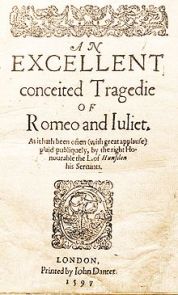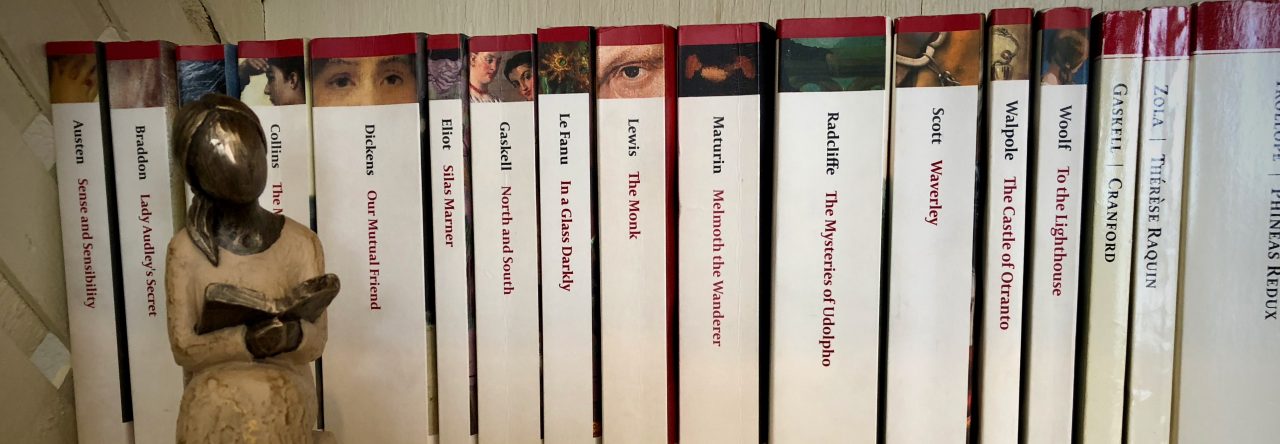One of my goals this year is to revisit a few books that I developed strong feelings towards in high school and give them a second chance. Last fall, after avoiding Huckleberry Finn like the plague for years, I had to read it, and actually enjoyed it. This made me wonder how many other once-despised classics I might actually like. I’m beginning with that one Shakespeare play I have avoided teaching like the plague:

Book: Shakespeare’s Romeo and Juliet
Edition: Pelican Classics
Bought: Used
Verdict: Still not my favorite, though for more complex reasons.
Shakespeare’s verse is always great, even in his early plays like R&J. Some of the speeches, especially Juliet’s, are stunning. The meeting between Romeo and Juliet in 1.5 is beautiful. And I actually liked Juliet, as a character. She seems like a neat young woman, strong and passionate, if a little unguided. Here’s her reaction to her Nurse’s monumentally bad advice (see below):
Is it more sin to wish me thus forsworn
Or to dispraise my lord with that same tongue
Which she hath praised him with above compare
So many thousand times? Go, counselor.
Thou and my bosom henceforth shall be twain. (3.5.248-253)
Speaking of guidance, the four main adults in this play, Lord and Lady Capulet, the Nurse and Friar Lawrence, are pretty awful. Lord Capulet demands that Juliet marries Paris in three days, or he will disown her. It is apropos of nothing, and he comes across as a major jerk. Lady Capulet seems rather ignorant regarding what goes on in the mind of her daughter.
The Nurse and Friar Lawrence aren’t much better. They go along with the infatuation of two teenagers, for one. Also, the Nurse, on hearing Juliet is supposed to marry Paris, responds by pointing out that Paris is better looking than Romeo and since Romeo is banished, why not just marry Paris? It was a shame; I liked her until that point.
Also poison. Seriously? How about when Juliet needs to get out of town you just send her out of town, Friar Lawrence? At least he ought to have had a slightly better backup plan  for the undelivered note. He knew Romeo was quick to jump to self-harm as a solution.
for the undelivered note. He knew Romeo was quick to jump to self-harm as a solution.
And Romeo is a whiny, over-dramatic, impulsive young man. And there are far too many sex jokes.
BOTH Romeo AND Juliet threaten to kill themselves at one point in the play. It makes the ending feel a lot less romantic and a lot more tragic.
On further reflection, I think this is actually the problem I have with the play: it is treated like a dramatic romance. It’s not.
It’s a tragedy, one every bit as tragic as King Lear. By the end of the play there are no more young people left (except Rosaline and Benvolio. I hope they got married and got out of Verona). The play seems like it shows the harm unexamined prejudice and poor  ruling (I’m looking at you, Prince) can do to a community. At the end, the feud between the Montagues and Capulets is healed, but what future do either of the families have? None. Tybalt, Mercutio, Paris, Romeo and Juliet are all dead.
ruling (I’m looking at you, Prince) can do to a community. At the end, the feud between the Montagues and Capulets is healed, but what future do either of the families have? None. Tybalt, Mercutio, Paris, Romeo and Juliet are all dead.
I think I would appreciate it if we stopped being all misty-eyed about Romeo and Juliet. There is nothing admirable about most of these characters, or their actions. If we are going to keep teaching it to teenagers, let’s use it to show them what not to do; to brainstorm ways Romeo and Juliet could have solved their problems without killing themselves. There is already a problem with teenage suicide – let’s not add any fuel to the fire.
Update 2/19: I just revisited this because reasons, and although I do stand by my assessment, past me could have worded it a little better. Live and learn.
I wanted to point out two additional things I’ve since learned, that further complicate the “romantic love story” reading. First, the Nurse is a stock character who is meant to be not just funny but highly problematic – a dispenser of awful advice, though good intentioned.
And second, Romeo is the classic Petrarchan lover, the Elizabethan lover-ideal, to a fault. This makes me suspicious of his sincerity. Shakespeare played with this ideal throughout his career (see also Berowne in Love’s Labors Lost and Claudio in Much Ado about Nothing). One significant aspect of the Petrarchan lover is a devotion to an unattainable lady (see: everything Romeo says about Rosaline). Would Romeo and Juliet have had a happy marriage? I’m unsure.

